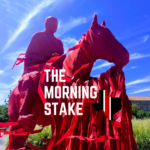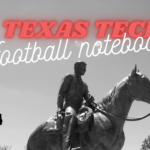One of the early quotes from Kliff Kingsbury, way back in 2013, when Texas Tech started the season 7-0 and things were looking up for the Red Raiders with the Sooners on the horizon.
The Oklahoma game would mark 5 straight losses for the Red Raiders before a season-ending win over Arizona State. 2013 was the year of dual freshmen quarterbacks and Kingsbury’s first year.
At some point, Kingsbury said, “Fortune favors the bold,” and that phrase was the team’s rallying cry for those 7 games. The phrase itself (Wikipedia) is from a Latin proverb that could be interpreted as, “fortune favors the brave,” and turns up in the Aeneid, a poem written by Virgil between 19 and 29 BC.
One of the more famous uses of the phrase happened at the eruption of Mount Vesuvius in 79 AD, when the two Plinys encountered the volcano that would end up covering Pompeii in magma (I think of Austin Powers when I write this word), lava and ash.
Pliny the Elder, a commander of a Roman fleet, encountered a messenger who said that a friend, Rectina (let’s all try to be mature here), who said that they were trapped and the only way to escape was the sea. As Pliny the Elder continued, with rock, pumice and hot cinders showering Pliny the Elder and his small crew, and although the crew told him to go back, Pliny the Elder said, “Fortune favors the brave.” Pliny arrived at the location, a wind that brought in the ship would not allow him to leave, and Pliny the Elder eventually collapsed and died. Pliny the Elder’s crew eventually escaped by land and some say Pliny the Elder’s death was a result of exhaustion, or the inhalation of sulfur, but most likely it was a heart attack or stroke.
Meanwhile, Pliny the Younger, the only eyewitness survivor of Vesuvius, decided that the three tremors that happened the night before the magma rolled through the streets, to take his mother, wife of Pliny the Elder, escaping although ash was covering him and his mother. The two eventually returned home, waiting on Pliny the Elder, who would obviously not return.
We could maybe say it is somewhat ironic, looking back at 2013 given the history of Pliny the Elder. Fortune assuredly did not favor Pliny the Elder, who simply collapsed under the weight of Vesuvius and could not save his friend. The title of this post, “Fortune Favors . . . Those Who Take Note of And Observe Their Circumstances” is snarky and truthfully, I don’t know that Pliny the Elder could have known what was in store for him and the magnitude of Vesuvius. I suppose that you could say the same thing about Kingsbury, who could have known how things would have turned out. I still think that fortune favors the educated (don’t go towards a volcano), who happen to have the right circumstances present themselves (the wind is not blowing so as to keep you from reaching safety) so that you can accomplish your goals.
Kingsbury has essentially all but withdrawn use of that phrase and probably rightfully so because I think that Kingsbury has more or less adopted the phrase, “Fortune Favors . . . Those Who Take Note of And Observe Their Circumstances” because boldness really only favors those who are prepared.








